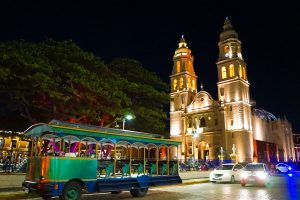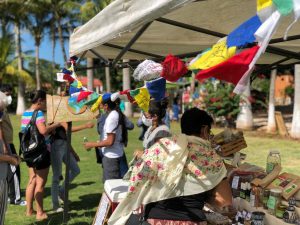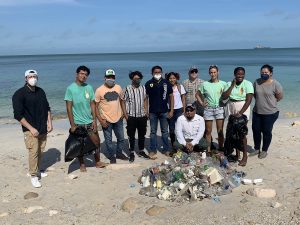Generating Socio-environmental Opportunity
Nestled away in Mexico’s tropical southeast sits the quiet community of Campeche, hugging the coastline of the Gulf of Mexico. Although unassuming, this enclave of historic colonial charm offers far more than the eye can see at first glance.

Charming Campeche, Mexico.
The state and the city are quickly gaining recognition for local programs which generate a space of socio-environmental opportunity for its citizens whilst addressing global environmental concerns. Over the last few months, this variety of organizations and initiatives – which ranges from turtle conservation to sustainable local markets – have partnered with Plastic Oceans International as part of the new BlueCommunities initiative, designed to holistically address a variety of environmental problems, in particular the plastic that is devastating our oceans.
“It’s such a visible problem,” says Carlos Callejas, an agro-ecologist who is part of the local team. “And that’s what we see; out there is a whole ocean of problems beyond our visibility.”
Campeche’s local teams have been working in these areas for a number of years now, with a cross-society community mesh of individuals, family groups and small organizations driving change forward. Perhaps most well-known among the wide variety of initiatives is the weekly Mercado Verde (Green Market) in the city, which features up to 50 local vendors who produce artisanal goods ranging from soaps to handicrafts to zero-food-miles organic produce. In addition, the market now even has a burgeoning second-hand section designed to give people the opportunity to buy good-quality used goods as well as helping audiences rethink their purchasing habits.

Campeche’s Mercado Verde.
“The work isn’t new,” says Koki Navarro, an artisan who works across the projects, “but the relationship with Plastic Oceans – in particular as part of the BlueCommunities community – means that it helps us all push forward recognizing that we are not alone. It gives us a sense of belonging, internationally, and increases our collective sense of purpose. Before these projects I made work, but now I try to bring sustainability into everything I do.”
Of course, thanks to its coastal location, citizens of Campeche are no strangers to the scourge of ocean pollution – waves of plastic waste literally washing up on the shores of its picturesque bay any given day of the week. In addition, the city has seen an 80% decrease in its sea turtle population over the past few decades, due at least in part to the plastic which has become a multi-faceted hazard. However, with support from Plastic Oceans, last year’s turtle conservation work on the beaches of Seybaplaya measured a record year for turtle nests and hatchling releases, suggesting that the broad bodies of work are taking effect.

Plastic Oceans, Ninth Wave Mexico and Yuumtsil Káak Náab clear a sea turtle habitat of plastic pollution.
“More than anything, being part of BlueCommunities reminds us that around the world there are many of us fighting for the same thing. Environmental work can be a lonely place, when often it feels as though everything is against you,” says Yvette Griffiths, a local coordinator with Ninth Wave Global. “With BlueCommunities we know that there are others fighting the same fight, and that together we can make change happen, and make a real, tangible difference, locally.”
Tod Hardin, Chief Operating Officer of Plastic Oceans, recently spent four months in the community, overseeing its role as the pilot program for the BlueCommunities initiative.
“Campeche certainly isn’t free of challenges, but his is a community that cares and has passion,” said Hardin. “From its local citizens to the wonderful partners we have in Ninth Wave Mexico, Mercado Verde and Yuumtsil Káak Náab, we could not have been happier with the results. A true community working together to make a difference locally, while providing inspiration for others around the world.”
Even in our most globalized of worlds, the most important thing we can do, it seems, is make human connections.
For more information on the Plastic Oceans International’s BlueCommunities program, visit: PlasticOceans.org/bluecommunities
Rachel Kester is a freelance writer from Virginia whose work covers topics ranging from environment to travel. She also reviews books, art and other creative pursuits, often with a socio-environmental focus.

Trackback: ศูนย์ดูแลผู้สูงอายุ
Trackback: juvelook
Trackback: socom 16
Trackback: 12bet thailand ให้บริการอะไรบ้าง?
Trackback: ลดข้าวดีด ข้าวเด้ง
Trackback: ทดลองเล่นสล็อต ฟรี
Trackback: เว็บ บาคาร่า วอเลท
Trackback: promo